Back to the multiplex
Much to my own surprise, just five weeks into the year I’ve been to the theatre twice already. (Last year, I went out to a movie only three times.) And this during the coldest week of the winter so far. This was largely due to my friend Curtis emailing to let me know what was opening at the multiplex. Strange that this early in the year there should be two new movies by filmmakers whose work I’m interested in seeing.
*

Infinity Pool (Brandon Cronenberg, 2023)
It must be difficult having a famous – somewhat notorious – parent and want to work in the same field as them. There’s recently been attention paid to “nepo-kids” in the entertainment industry. It seems obvious that having a successful parent will get you through the door, but once that advantage has been made use of it still requires talent to establish and sustain a career of your own, and in some ways the parental reputation might actually be a burden – particularly if you choose to work in the same niche. Brandon Cronenberg has done just that, exploring themes similar to David’s – the intersection of technology with fragile biological bodies, a fascination with disease and identity – but since the start of his own career he’s displayed an original talent, forging his own identity while inevitably evoking echoes of his father’s work.
His third feature is his darkest yet and I think I’ll have to see it again before forming a clear opinion. Uncomfortable and grim, Infinity Pool (2023) is initially rather off-putting; I disliked the characters and watching events unfold had a cool, detached, almost clinical quality. These people, monsters of privilege, are observed like specimens dropped into a constrained environment so that we can see how they devour one another. Dark and claustrophobic (it was shot who Karim Hussain, who also shot Cronenberg’s first two features, Antiviral [2012] and Possessor [2020]), the film deals with the unfettered hedonism of the wealthy but strips their indulgence of any appeal. This grim moral condemnation seems to weaken the satirical intent – surely the audience should at least initially experience some kind of desire and envy, which then becomes problematic?
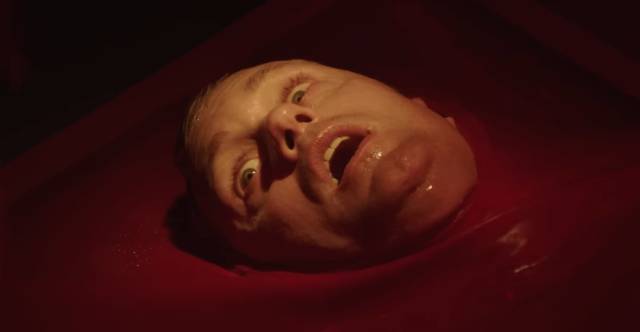
There’s an uneasiness from the first moments, in which we hear voices in darkness before being introduced to writer James Foster (Alexander Skarsgård) and his wife Em (Cleopatra Coleman) who are vacationing in an exclusive resort in the fictional country of La Tolqa. Overlooking the sea, the resort immediately seems isolated from reality, its customers sealed behind security fences patrolled by armed guards. It’s forbidden to leave the compound because the impoverished country is dangerous for tourists, with locals resentful of the privilege being flaunted in the face of their own poverty.
One morning on the beach, James is approached by Gabi Bauer (Mia Goth), who tells him how much she loved his book and wonders when the next one will be coming out. She and her husband Alban (Jalil Lespert) invite him and Em to join them for dinner and quickly draw James in with flattery, though Em remains a bit suspicious of their interest. Things become uncomfortable when Gabi and Alban convince them to join them on an illicit trip outside the compound in a borrowed car. Gabi applies increasingly seductive pressure on James as they have a picnic in a cove and everyone drinks too much.
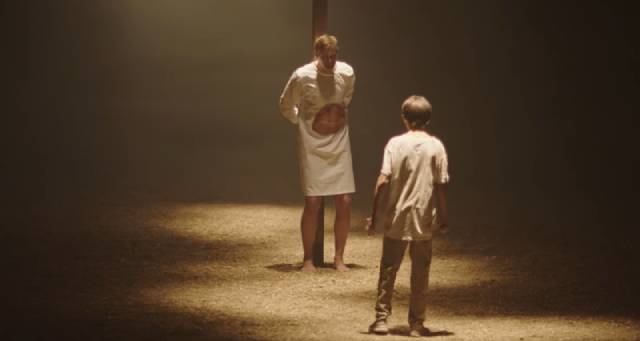
James takes the car keys from a very drunk Alban and begins the drive back in darkness. The car has faulty headlights and suddenly there’s a figure in the road; James has run over a local man and when he and Em want to contact the police, Gabi and Alban insist that would be disastrous – they know the locals, who are brutal and unforgiving. They must get back to the resort immediately and act as if nothing has happened.
Up to this point, the film has been an exercise in social discomfort. There are stresses in James and Em’s marriage – an unsuccessful author, he’s been living off Em’s personal wealth as the daughter of a powerful publisher who dislikes her choice of husband – and something unsettling about the couple who have taken over their vacation and led them to a terrible situation. But the next morning things shift to a very different register when the local police arrest James and he finds that Gabi and Alban have put all the blame on him.
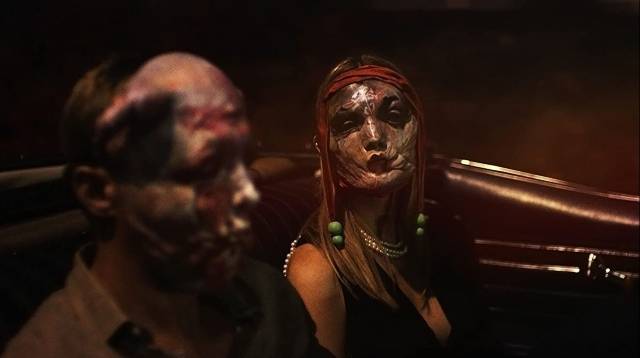
He quickly learns that the penalty for his hit-and-run crime is death – more specifically, that the dead man’s relatives are permitted by law to kill him. But there is a way out of this nightmare: the policeman (Thomas Kretschmann) explains that for a fee, a double can be created, someone who not only looks exactly like James, but will also possess his memories and personality. James can continue to live, while his clone pays the penalty. This is obviously something which is well-established as there’s an ATM in police headquarters for the purpose and James draws out a thick wad of cash before being stripped and placed in a room where he’s immersed in some kind of thick slime.
Seeming to wake from the process, he’s led into a bleak chamber and shackled to a post. The dead man’s adolescent son approaches tentatively, reluctant at first, but after jabbing him once in the belly with a knife, suddenly tears into him savagely – and we see James, Em and others watching from bleachers nearby. Em is sickened, but James is fascinated, watching himself being brutally killed, exhilarated to find himself still alive, escaping responsibility for his crime.

James finds himself being initiated into a kind of club comprising wealthy tourists who have all gone through this experience, presided over by Alban and, particularly, Gabi. They have all been “liberated” and now do whatever they feel like – there are orgies, of course, but also increasingly extreme acts of violence. Having been freed from any consequences for their behaviour, they indulge every impulse as they terrorize others, torturing and killing, and pushing James to follow them into a kind of communal psychopathology. Although he has compunctions and makes token attempts to resist, any moral sense disintegrates as he gradually comes to accept this perverse form of “freedom”. Committing more crimes and undergoing duplication again, even watching an identical double being brutally executed becomes a form of entertainment.
As a viewer, you want James to find the strength to resist, to extricate himself from this toxic situation, and late in the film he makes an attempt, but the pull of the “game” is too strong – Gabi’s mockery and contempt overwhelm him and he submits to the group’s redefinition of his self by killing his double with his own hands, destroying whatever part of his former socially constrained self had remained. It’s a depressingly bleak view of human nature, and one which I certainly wouldn’t want to accept as absolute. Cronenberg presents his proposition with skill – the film, like his previous features, is impeccably crafted, but its ugliness is off-putting. Still, I will watch it again at some point to see whether I might have missed some nuance which mitigates its apparent cynicism.
*

Knock at the Cabin (M. Night Shyamalan, 2023)
Just six days later, Curtis and I braved the bitter cold again to catch the first matinee screening of M. Night Shayamalan’s new movie, the awkwardly titled Knock at the Cabin (2023). Rare for Shyamalan, this is based on a novel (The Cabin at the End of the World by Paul Tremblay) rather than an original script, but it nonetheless has the feel of one of the writer-director’s own stories. Essentially, it’s a psychological puzzle in which a group of people have to figure out fact from delusion with the possible consequences being the literal end of the world.
Dads Andrew (Ben Aldridge) and Eric (Jonathan Groff) are on vacation with their adopted daughter Wen (Kristen Cui) in a remote cabin when four strangers arrive bearing an assortment of strange, rather medieval-looking weapons. Led by Leonard (Dave Bautista), seemingly rather gentle despite his menacing size, the four demand to be let into the Cabin because they have something very important to tell the family; when Andrew and Eric refuse, the strangers break in and Eric receives a serious concussion during the ensuing fight. Overpowered, the two dads are tied to chairs and Leonard explains what’s going on.
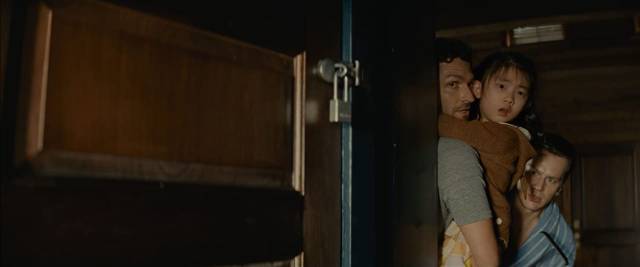
The four intruders – Leonard, Redmond (Rupert Grint), Sabrina (Nikki Amuka-Bird) and Adriane (Abby Quin) – are strangers to one another, brought together by shared visions of the apocalypse which have led them to the cabin on an urgent mission. They didn’t know who they would find there, but they do know that they must convince the occupants that one of them must be willingly sacrificed in order to avert the apocalypse and the death of all human kind.
Needless to say, this is a tough idea to swallow and the four intruders themselves are conflicted and fearful – they didn’t choose this mission and as Andrew and Eric resist, they have to confront their own doubts. Although phones don’t work out here in the woods, there is television and Leonard turns it on at critical moments to show the beginning stages of worldwide disaster. But there are signs that what’s being seen could be simple coincidence, manipulated to draw Andrew and Eric into the intruders’ shared delusion.
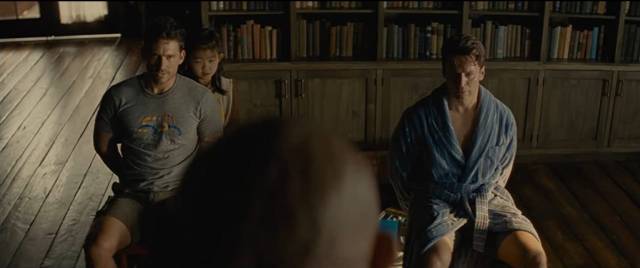
For much of the running time, the back and forth between the strangers and the family is fraught with tension, particularly as it plays on Eric’s own suppressed religious beliefs. The conflict between reason and irrational beliefs being played out among people who don’t subscribe to a Biblical worldview is handled well by Shyamalan and his cast, and as long as things remain ambiguous the film is up there with his best work. It does a fine job of exploring the ways in which members of a cult go to extreme and convoluted lengths to persuade themselves of the truth of something which requires them to do terrible things, as well as the ways in which trying to persuade non-believers of that truth causes cracks in their conviction. But towards the end, Shyamalan backs himself into a corner and the only way out of ambiguity is to come down on the side of the “truth” of a religious fundamentalist worldview. It turns out that the apocalypse is real and the family’s sacrifice does indeed save the world.
Maybe it’s just my own complete lack of religious belief that makes this irritating to me. In narrative terms, I’m able to accept almost anything if a story can justify what I’m being told – just compare Knock at the Cabin with Michael Tolkin’s The Rapture (1991), which follows the idea that the Christian fundamentalist apocalypse is absolutely real to its logical conclusion, and in so doing exposes just how monstrous that worldview actually is; but in the end Shyamalan doesn’t offer a critique of that view, but merely affirms it. It could have been possible to maintain ambiguity to the end, but perhaps that was considered commercially risky; yet to suggest that a god would demand a willing sacrifice from random individuals in order not to kill eight billion people and to present that sacrifice as a positive thing is pretty obnoxious.
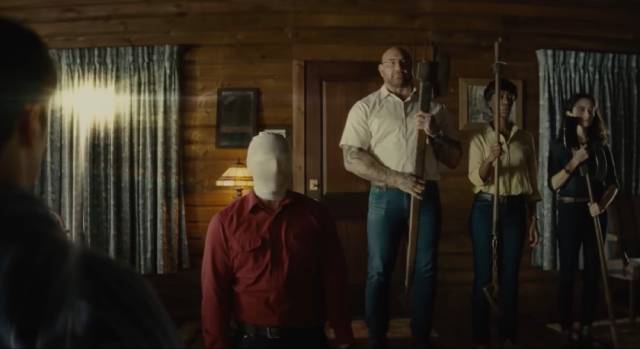
However, despite the ending, there’s much to like about the movie. Beautifully shot by Jarin Blaschke and Lowell A. Meyer, there’s a nice contrast between the peaceful forest setting and the cozy cabin and the escalating craziness and violence which intrudes into the relaxed atmosphere of a family vacation. Best of all is the excellent cast. There’s an unforced natural quality to the relationships between Andrew, Eric and Wen, which plays well against the conflicted feelings of the intruders, none of whom are comfortable with the role assigned to them by a malevolent god. Rupert Grint decisively leaves Ron Weasley behind, and Quin and Amuka-Bird convincingly convey the confusing struggle between the idea of individual care and a care for the world which demands inflicting individual pain. And then there’s Dave Bautista, who’s unexpectedly becoming a nuanced actor, working here against his menacing appearance to create a sensitive character genuinely tormented by what he believes is absolutely essential to save the world even as it inflicts unbearable pain on people he empathizes with. Leonard is the script’s juiciest role and he seizes it to dominate the movie.
Comments